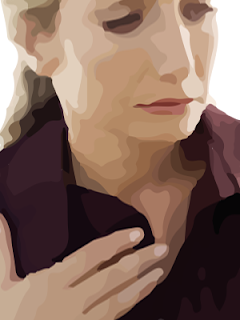Inappropriate sinus tachycardia
 |
| Inappropriate sinus tachycardia |
Inappropriate sinus tachycardia is most common in women in their late 20's and early 30's and they have symptoms for several months. The patient's heart at rest beats more than 100 beats per minute, but dropping during sleep, while the slightest fatigue can go up to 150 beats per minute.
For the diagnosis of inappropriate sinus tachycardia there are no formal diagnostic criteria and the diagnosis is made on the basis on exclusion of all other reasons for sinus tachycardia, typical types of supraventricular tachycardia needs to be excluded, study of the structure and content of normal spread of electrical activity over the atrium, nocturnal dip in number of heartbeats per unit of time, inappropriate number of heartbeats per unit of time that are response on physical effort, number of heartbeats per unit of time in a day more then 95 beats per minute and low blood pressure is sometimes noticed.
Natural cause of inappropriate sinus tachycardia is not yet established. Inappropriate sinus tachycardia eventually disappears after several years of treatment. Patients with inappropriate sinus tachycardia are sensitive to adrenaline and even small doses can cause tachycardia, therefore beta blockers can be used. Also calcium blockers can be used, they can reduce the high heart rate but they are used very rarely.
Inappropriate sinus tachycardia can be treated with the above mentioned and some other methods, but requires good communication between the patient and the doctor, because treatment progression is on an experimental basis and requires great trust. There are alternative-methods as the increase salt intake (with the support of the doctor), ablation of the sinoatrial node or waiting because it has been shown that the disease disappears over time.
 |
| Inappropriate sinus tachycardia |